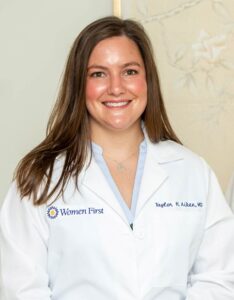Women First focuses on all aspects of women’s health
LOUISVILLE At Women First of Louisville, the obstetrics and gynecology practice is not limited to caring for women of child-bearing age, but to caring for women during all stages of life.
Katherine Shannon, MD, and Taylor Aiken, MD, two of the group’s newest doctors, say that while traditional OB-GYN care is important, care during adolescence, pre-childbirth, and post-menopause is as important to a woman’s health, and that of any babies she may have, as is prenatal care.
“Lots of women will come to us during those reproductive ages, between adolescence and menopause, because they are pregnant and they seek out care during that time of their life,” Shannon says. “But many times, I find that adolescent women don’t feel comfortable coming to the OB-GYN. Similarly, the other extremes of age, women who are past child-bearing age sometimes don’t even know if they’re supposed to still come to the gynecologist anymore. Those are two really unique groups and a good opportunity where we can educate and show where we can help improve their lives.”
Shannon says she is particularly interested in providing care for adolescent and post-menopausal women. After completing her undergraduate degree at the University of Kentucky, Shannon moved to Louisville to attend medical school at the University of Louisville School of Medicine. In 2013, she completed her residency at the University of Cincinnati.
“I like to counsel younger women on pregnancy prevention, having healthy sexual relationships, and the prevention of STDs,” she says. “I like to see women early because those first visits often don’t even involve a pelvic exam and it’s a great chance to make them comfortable in our office and show them that they can be comfortable in asking those ques-

“Refining our use of hormone replacement therapy in ways that we can do it more safely and more effectively has been one of the biggest changes in our post-menopausal care.” — Katherine Shannon, MD, OB-GYN
tions and talking about more sensitive issues in a really non-judgmental setting.”
The same is true for older women, Shannon says.
“That’s a time where we can really address their day-to-day comfort if they’re having menopausal symptoms,” she says. “I like talking about sexual health in that age group as well, where a lot of women feel like there’s nothing left to offer. They might not even know to ask those questions, but there’s a chance that we can really help to improve their quality of life with some really simple things.”
New Era for OB-GYN Care
Women’s OB-GYN care has changed quite a bit over the past few decades, says Shannon and it is helping women in ways it didn’t before. “In the past 20 to 40 years, there have been some major transformations in those areas of women’s health care.”
Among those are changes in hormone replacement therapy. After studies in the 1990s suggested an increase in cancer for those using hormone replacement therapy, new information has found hormone replacement therapy to be safe and effective.
“Refining our use of hormone replacement therapy in ways that we can do it more safely and more effectively has been one of the biggest changes in our menopausal care,” Shannon says. “We have also expanded our knowledge and treatment of perimenopausal symptoms, which are those years in the late 40s when we start noticing a lot of changes in how women feel and function. That was an area of medicine that was essentially ignored for most of my medical education. Now we’re starting to pay attention to this group of women and actually address their problems. A lot of them felt like they were shouting into the void and not getting any answers for a really long time.”
Additionally, Women First has changed in the use of pelvic floor physical therapy. In those cases, particular attention is paid to the muscles and tissues in the pelvic region and involves exercises, manual therapy, and education to improve muscle strength, coordination, and relaxation. This specialized form of physical therapy can help with conditions like incontinence, pain, constipation, and pelvic organ relapse.
“It went from a small niche area to now being very widely used for a number of women’s health problems, especially in the treatment of various forms of pelvic pain, vaginismus, and even for some urinary symptoms,” Shannon says. “It’s a great way to improve women’s function without having to resort to medications or surgeries that may have side effects or complications. It can help women regain their own natural function and muscle tone there.”
Sharing the Obstetrics Care
As important as taking care of the whole patient is to the practice, Taylor Aiken, MD, says, so is having the whole practice take care of the patient. As a practice on the forefront of providing women’s care, Women First uses a team approach that allows those new to the field to learn from experienced women’s healthcare providers, Aiken says.
“Our obstetric patients are considered the shared responsibility of our OB providers, which also means we share labor and delivery responsibilities and overnight call,” she says. “While a patient may see one provider the majority of their pregnancy, we try to have them seen by other delivering providers at some point prior to birth in order to increase the odds that the patient will be familiar with their delivering doctor. With more providers comes more connections to clinicians at different practices and institutions. That insight into how others are practicing allows us to look at our own methods to see how we may change to do better for our patients.”
A Louisville native, Aiken was delivered by Rebecca Terry, MD, one of Women First’s original doctors, now retired and a member of the Emeritus Physicians at Women First. Aiken graduated summa cum laude with honors from the College of William and Mary with a focus on kinesiology and health sciences and received her medical degree at the UofL School of Medicine where she did research on early-stage cervical cancer. After graduation, Aiken stayed in Louisville for her residency in obstetrics and gynecology.
Being around healthcare providers with extensive experience helps staff learn and grow, she says.
“We routinely evaluate our care methods regarding certain common obstetric conditions to ensure the patient is receiving high-quality care guided by emerging evidence, while also acknowledging the individual strengths and expertise our partners bring to the table,” Aiken says. “We believe this collaborative model is crucial to preventing burnout, as it affords our providers the opportunities to focus on their other identities and roles outside of work… so that we can show up to work each day as the best version of ourselves for our patients.”
The practice also works with other practices that focus on perinatology, or maternal-fetal medicine, and provides care for the mother and the fetus prior to, during, and after pregnancy.
“In the era of modern medicine, our ability to diagnose, detect and treat various conditions has increased dramatically and thus the role for expertise in highrisk maternal and fetal care has also increased.” — Taylor Aiken, MD, OB-GYN

“In the era of modern medicine, our ability to diagnose, detect, and treat various conditions has increased dramatically, and thus the role for expertise in high-risk maternal and fetal care has also increased,” Aiken says. “Because we are a private practice, we can refer to any MFM group or provider to best suit the unique needs of our patients regardless of hospital affiliation. Frequently our patients may have visits with MFM and us on the same day, allowing patients to cluster their care. Additionally, these are the providers who consult on antepartum patients admitted in the hospital, so we like to keep that continuity and familiarity in a patient’s care at the forefront of our thinking.”
Adding Midwifery to the Practice
As of January 2025, Women First incorporated midwifery into their service mix.
“Our midwife, Nina Berry, is a former labor and delivery nurse who has years of history and rapport built with many of our providers, having worked alongside them for years prior to joining our practice,” Aiken says. “She functions in a role similar to any of our MDs and is involved in prenatal care as well as labor and delivery responsibilities including overnight call with a Women First MD on standby for high-risk patients or emergencies.”
Like Shannon, Aiken says the part of her work that gets her up every morning is providing women with comprehensive healthcare that addresses their needs at all stages of their lives. And being a doctor at the practice where she was first a patient allows her to do just that.
“I believe women deserve more and better in their healthcare and I am inspired to walk hand-in-hand with them throughout different phases of life to provide tailored and comprehensive care to the women of Louisville,” Aiken says. “The birth of my own two daughters has fueled this dream even more… As a patient of Women First long before ever having the chance to work here, I leapt at the chance to continue the legacy of the incredible founding doctors—seeing the practice almost as a “child” of my own to lead into the future.”



